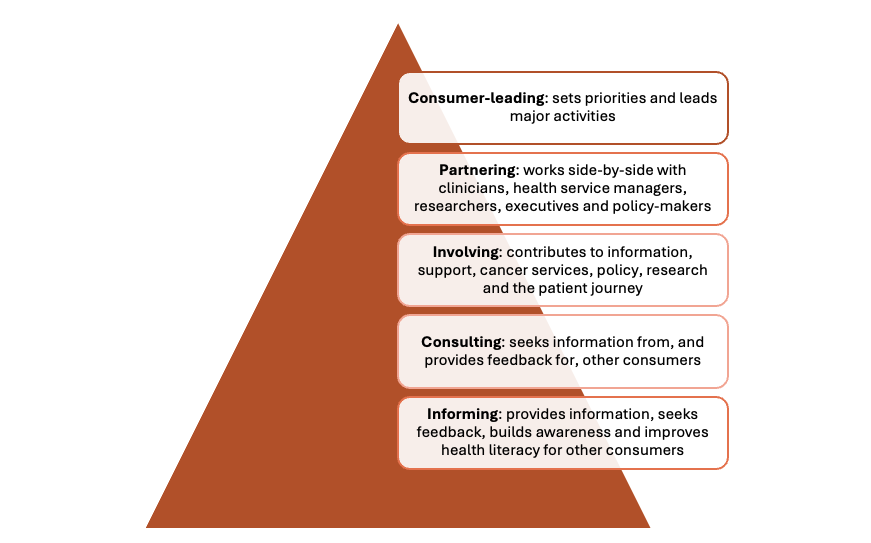Understanding why you want to involve consumers in your organisation is key to getting started. Before recruiting consumers, you should know:
- what management’s and staff’s commitments are to consumer participation
- who your consumers are
- how consumers would like to participate in our organisation, and where they can add value.
Consumer involvement is only effective across an organisation if it is supported by management at all levels.
The framework outlines 5 main levels of consumer involvement:
- consumer-leading
- partnering
- involving
- consulting
- informing.
The higher the level of consumer involvement, the greater the impact on health outcomes. The diagram below shows the role of consumers at each level.

A large part of consumer involvement is understanding and being explicit about the role consumers are expected to fulfil. Broadly, consumers can be involved in:
- planning services
- improving patient care throughout the cancer pathway
- educating and informing others
- measuring and evaluating services
- research, including clinical trials
- policy planning and development
- setting priorities.
Consumer engagement plans
Once your organisation has identified where and how consumers will be involved in the organisation, you can consider developing a consumer engagement plan. The plan does not have to be complex or overly detailed, but rather a simple guide that includes:
- a description of the issue or activity
- the organisation’s objectives
- where and how consumers will be involved in the organisation
- the participants your organisation wishes to involve
- strategies and key issues
- timelines
- budget and personnel
- an evaluation plan.
Also consider how your plan will be sustainable in the long-term. When developing your plan, it is important that policies and procedures are developed to ensure this sustainability. Policies will need to outline what resources are required, clarify roles and describe how to act on input from consumers. When developed and sustained over the long-term, your consumer engagement plan should enable your organisation and consumers to work together and provide feedback and accountability from consumer involvement activities (see Evaluation).
Expectations for consumers
Although each organisation will have slightly different policies and practices on consumer involvement, there are some basic practical provisions that consumers can expect when they choose to become involved. All consumers can expect to be:
- orientated and informed about the health service or organisation
- considered part of the team and be listened to
- respected for their knowledge, skills and experience
- kept up to date about any relevant information about meetings (including prereading) within a reasonable timeframe
- reimbursed for their time and any incidental costs
- provided with a support person or mentor from within the organisation for briefings before and after meetings, as necessary.
Recruitment
There are many approaches to selecting consumers to participate in activities, such as:
- asking a consumer organisation(s) for a nomination
- advertising and recruiting consumers based on selection criteria for a specific project or purpose
- selecting consumers through clinical, policy or research networks.
For advertising and recruiting consumers, the process for engaging consumers is similar to recruiting staff:
- Understand the consumer role you are looking to recruit for.
- Develop a position description and distribute among appropriate channels.
- Review applications.
- Select suitable candidates.
Consumers need to be selected based on the best matching of the position description and the candidates’ skills and experiences. Placing a consumer on a committee or group for which they are unsuited can be damaging to the entire consumer movement within your organisation. If you have doubts, organise extra meetings to ensure you are engaging the correct consumer.
Reimbursement
Most professionals attend committees as part of their salaried positions. Consumers, however, often have to take time off from other commitments to participate. This can place financial as well as physical strain on them, especially if they are not in full-time employment. It is usually recommended that, at a very minimum, organisations cover all out-of-pocket expenses. They should also consider paying consumers a sitting fee if they are serving on the board.
Examples of expenses include:
- travel, including transport fares, parking and tolls
- accommodation, if applicable
- child-care costs to cover attendance at a meeting
- attendant carer to support attendance at a meeting
- printing meeting agendas and associated documents, if not provided by the organisation
Consumer training
Any consumer training should be developed and delivered according to adult learning principles. Adult Learning Australia helps define these principles.
Training should be facilitated by people who understand the health system, and have knowledge and experience with consumer involvement. Involve guest speakers where appropriate. This may include staff, other consumers, carers, key stakeholders or representatives from other relevant organisations.




